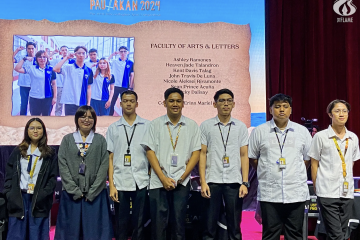
PHILOSOPHY MAJORS were encouraged to comprehend the relevance of mysticism in embracing one’s faith by engaging in philosophical talks in a forum titled “Mysticism: A Challenge to Spiritual Intimacy” held Wednesday at the Engineering Conference Hall.
Mysticism, as defined by Assoc. Prof. Reynaldo Reyes, is an intimate experience with the absolute being and an aspect of philosophy which focuses on the recognition of the unseen but felt.
“What is essential is invisible to the eyes. Yet, at times, what are invisible to the senses are more real than what we see ─ beauty of truth, the sincerity of a person, [and] the love of a mother to a child are not themselves visible,” he said.
Reyes also likened mysticism to love because both cannot be understood by reason but can be realized by faith. “Mysticism has its own language just like love has its own language,” he said, citing that mysticism blinds the person because the naked beauty of the divine is too powerful to be recognized by the person.
Furthermore, Bro. Romualdo Abulad, SVD said that although mysticism is a personal experience that cannot be easily shared to other people who are not mystics.
He added it is a universal experience, as every person can become mystic regardless of their race, culture, and religion.
“True mysticism is not just private. It extends inner experience to the sphere of public life,” he said, citing that one can share personal experience and translate it to mercy and compassion through mysticism.
Abulad added that mysticism is the future of religion because it breaks the religious barriers and connects the mortal to the divine.
In his closing remarks, Philosophy student Reuben John Valentin said that mysticism is a communion of the individual and the divine; therefore, it should be treated as a public experience rather an isolated one. F – Maria Lorraine G. Sajorda



